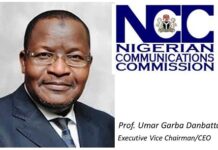The Nigerian Communication Commission, NCC, says call masking and refiling has been curbed under the leadership of Professor Umar Danbatta.
According to NCC, in the wake of 2017, the menace of call masking/call refiling and SIM boxing reared their ugly heads but the Commission took drastic actions towards addressing the issue.
The NCC explains that call masking is when inbound international calls terminating in Nigeria as a local number.
This raises serious security concerns, competition issues among licensees and portends negative economic implications in terms of losses of appropriate taxes accrued to the government through inbound international calls. In fact, it is estimated that globally, call masking is causing the economy $60 billion annually.
However, the Commission said in a statement signed and sent to DAILY POST by Kunle Azeez, Head of NCC Public Affair (Online Media and Special Publications) that NCC “took a number of regulatory actions towards curbing the menace of call masking: These include ensuring strict compliance monitoring and enforcement by the Commission; imposition of appropriate sanctions by the Commission on licensees involved in call refiling and masking activities; and suspension of numbering plans of some perpetrators and withdrawal of all their inactive numbering plans”.
“Other measures are taken in this regard include the continuous sensitization of consumers and other industry stakeholders on the dangers of call masking, which is still ongoing; the development and institution of new reporting requirements on interconnecting licensees that make it easy and seamless to quickly identify perpetrators of call masking and the Proof of Concept (PoC) commenced in July 2018 with the deployment of technology solutions to monitor, report, apprehend and block SIMs being used for SIM boxing activities and prevent SIM lines from being used for call masking activities.
“The above smart interventions generated profound results for the industry. First, by the end of 2018, call masking (otherwise called call line identity (CLI) spoofing) had dropped to more than 40 percent compared to how prevalent it as of January 2018. Also, SIM boxing traffic was down by about 25 percent as of September, 2 018.
“Today, following further enforcement by the Commission for telcos to deploy special technology solution across their networks, cases of call-masking or call refiling, consumer complaints around call-masking have practically come to a halt.”
The NCC also said that under the leadership of Danbatta as its Executive Vice Chairman, it boosted the quality of service and investors’ confidence.
It said that in keeping with its continuous commitment towards ensuring that telecoms operators deliver consistently improved QoS to their over 179 million subscribers, it had in the last four years embarked on a series of initiatives that have relatively helped in boosting the quality of service delivery across mobile networks.
The statement added that “Through continuous monitoring of operators’ compliance with the Key Performance Indicator (KPS) on Quality of service (QOS) on a state-by-state level, as against measuring operators’ compliance on a national average basis, the regulator helped to boost QoS delivery in this regard. Today, complaints associated with call drops and related have reduced remarkably.”
The Commission said it also stepped up stakeholder engagement and collaboration both within the private and public sectors of the economy to address salient and trendy issues affecting the industry, as it continues to make remarkable inroads in this direction.
The statement added that the Commission’s timely interventions in Ogun, Kano and Kogi state among others, resolved cases of the indiscriminate shutdown of telecoms sites by state agencies over disputed taxes and levies are worthy of highlighting.
It said “In Kogi State, for instance, more than 70 base stations were sealed by the Kogi Inland Revenue Service (KIRS) in 2018. Going by the nature of telecommunications service, which relies on 24/7 availability, each time a base station is shut down or sealed by a state agency, it automatically affects several services depending on such telecoms platform for proper functioning, exerting adverse effects on the economy of the affected area as a whole.
“It is instructive to note that a similar intervention by the Commission, in collaboration with the CBN helped to rescue Etisalat Nigeria (now 9mobile) from the brink of collapse following a financial crisis involving a $1.2 billion syndicated loans obtained by the telco from a consortium of 13 banks. The landmark intervention gave the hitherto troubled telco a new lease of life as it has now regained its growth momentum.”
Assuring investors of the regulator’s determination with regard to the safety of their investment in Nigeria, Danbatta said at a forum that, “The NCC is working to address challenges facing the industry and most importantly, in the area of achieving a more friendly and enabling operating environment for faster telecoms infrastructure deployment.
“Only through this can we have improved Quality of Service (QoS) that will automatically translate to an improved Quality of Experience (QoE) for the over 172 million telecoms consumers in the country as well as sustain the confidence of investors in the telecom industry.”
He added further that, “the industry, having achieved over $70 billion investment, requires even greater infrastructure investment to achieve better digital transformation for our nation.
“To this end, all hands must be on deck. We need to understand the critical role that access to telecoms services play in all facets of our economy and we must work together to support the industry’s sustainability through improved quality of service and quality of experience for the consumers.”
The NCC said it engages consulting firms to carry out studies that aid its regulatory decision towards engendering healthy competition in the industry.
It said “For instance, the Commission engaged KPMG Professional Services to conduct a study on the Assessment of the Level of Competition in the Nigerian Telecommunications Industry. Today, competition has led to optimal performance from the different service providers because there is always that pressure from the insatiable consumers. “






